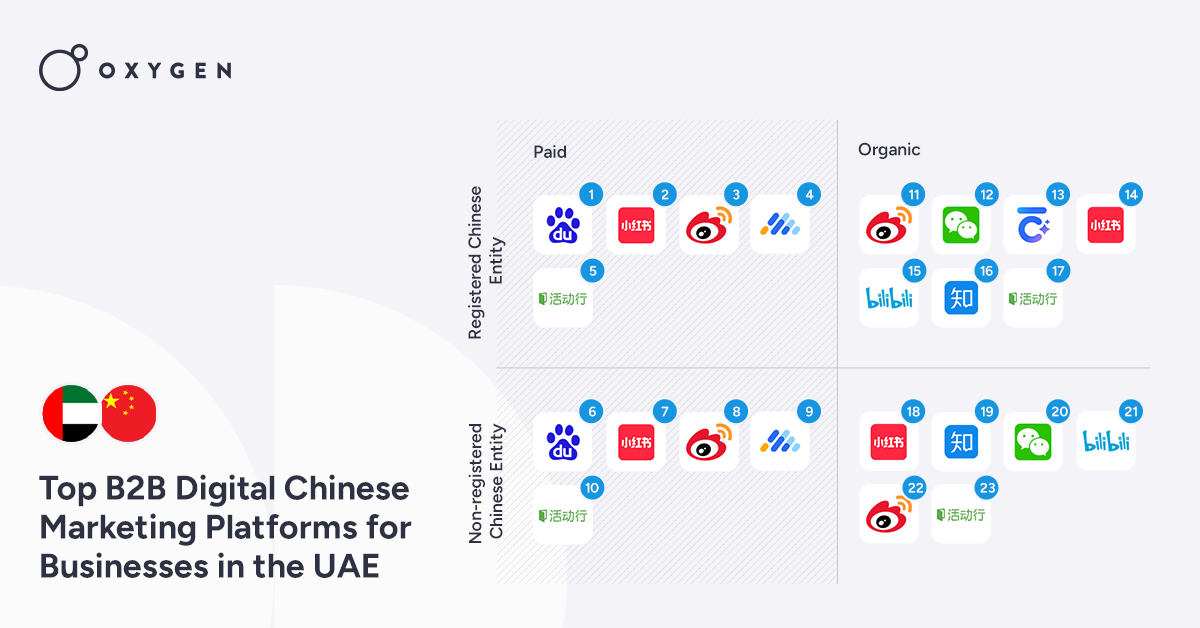For B2B enterprises in the UAE looking to engage with the Chinese market, a nuanced approach to digital marketing in China is essential. The distinct digital environment in China requires understanding both local platforms and the specific strategies that can bridge the gap between UAE-based businesses and Chinese consumers. Tailoring your approach to suit the operational nuances of these platforms can substantially increase your reach and impact.
It's important to remember that the best platform and the best selection of platforms will depend significantly on the industry you are in and whether or not you have a registered business in China. Unlike platforms in the West, Chinese platforms rarely share search results (think of getting Reddit results while making a Google search), meaning that they are mostly 'walled gardens' regarding brand exposure. The best strategy when it comes to marketing in China is platform diversification, meaning you have the best chance to be discovered on multiple platforms and not just one.

Note: Social platforms are ordered above to correspond with the numbers below, not by rank or preference.
Paid
Registered
- Baidu: As China's leading search engine, Baidu offers registered Chinese businesses the ability to engage in highly targeted PPC advertising. With local registration, companies can benefit from additional incentives like advertising vouchers, and their deep understanding of the Chinese market allows for more effective keyword strategies, leading to better ad placement and visibility.
- XiaoHongShu (Little Red Book): Registered businesses in China can harness XiaoHongShu's platform for targeted advertising, tapping into a vast network of consumers interested in lifestyle and beauty products. With features tailored to e-commerce and a user base that relies on authentic reviews and content, XiaoHongShu offers a fertile ground for influencer partnerships and brand storytelling.
- Weibo: Sina Weibo provides a powerful platform for registered Chinese businesses to launch diverse advertising campaigns. With options ranging from banner ads to Weibo stories, companies can leverage Weibo’s extensive reach to elevate brand presence, engage with users through interactive content, and track the effectiveness of their campaigns with in-depth analytics.
- Tencent Ads: Tencent Ads is part of Tencent's diverse business model, which includes video games, financial technology, social networks, and digital advertising. The ad network focuses heavily on mobile advertising. One of the key components of Tencent Ads is WeChat Ads, a part of the larger Tencent ecosystem. Tencent Ads leverages the massive user base of Tencent's various platforms, offering a significant reach for advertisers.
- HuoDongXing: A specialized platform for event marketing, HuoDongXing allows Chinese registered entities to utilize paid features like mass SMS notifications and targeted event promotions. This is especially useful for B2B companies looking to enhance their visibility and attendee rates at industry events, conferences, and seminars.
Non-Registered
- Baidu: While non-registered entities can still access Baidu's advertising network, they won’t get any vouchers available to Chinese-registered businesses. Despite these challenges, international businesses can use Baidu's PPC model to reach Chinese audiences by optimizing their campaigns for the Chinese market and navigating the platform's nuances from abroad.
- XiaoHongShu (Little Red Book): Non-registered international brands looking to tap into the Chinese market must navigate XiaoHongShu with a strategy that often hinges on partnerships with local influencers and content creators to build trust and authenticity, essential for advertising success on a platform driven by user recommendations.
- Weibo: International businesses can use Weibo's advertising services to connect with the Chinese market, albeit with more stringent regulations and without the same level of data insights available to local companies. However, creative campaigns and engaging content can still yield significant brand visibility and user interaction.
- Tencent Ads: Tencent's vast network can still be leveraged by non-registered international companies, although they might face more red-tape with account registration. Nonetheless, engaging content and strategic ad placements can help these businesses reach a broad Chinese audience.
- HuoDongXing: The platform offers a unique avenue for international companies to promote events to Chinese audiences. Despite lacking the local registration benefits, companies can still utilise HuoDongXing’s targeted SMS promotion tools to reach potential attendees interested in their events.
Organic
Registered
- Weibo: For organic social media presence, registered Chinese businesses can leverage Weibo to engage with a massive user base. By aligning content with current trends and user interests, companies can increase their organic reach and foster community engagement.
- WeChat: The platform's vast user base and social features make it an ideal space for registered businesses to grow organically. By sharing relevant and engaging content, companies can build brand loyalty and drive word-of-mouth marketing.
- Baijiahao: As Baidu's content platform, Baijiahao favors content from registered Chinese entities, offering them better visibility in search results and the ability to publish directly to a large and engaged audience.
- XiaoHongShu (Little Red Book): With its strong user-generated content aspect, registered businesses can engage organically with consumers, encouraging them to share their experiences and promote brand visibility through authentic storytelling and reviews.
- Bilibili: Bilibili, often considered China's answer to YouTube, has evolved significantly since its inception. Focusing on video content, registered Chinese entities can use Bilibili to connect organically with a predominantly young audience, leveraging the platform’s interactive features and community-driven content to enhance brand engagement.
- ZhiHu: Registered businesses in China can engage with users on ZhiHu by answering questions and providing expert insights, thereby building authority and brand credibility organically within the professional community.
- HuoDongXing: This platform allows registered entities to list and promote events, leveraging the organic reach of HuoDongXing’s user base to attract attendees through recommendations and social sharing features.
Non-Registered
- XiaoHongShu (Little Red Book): International brands on XiaoHongShu can still engage with Chinese consumers by utilising a personal account instead of a business account. Collaboration with local influencers and a focus on high-quality, relatable content can help overcome the need for local registration.
- ZhiHu: Non-registered entities use ZhiHu to share industry knowledge and engage with the Chinese audience through a free account. By providing valuable insights and participating in discussions, international brands can organically build a reputation for expertise in their field.
- WeChat: For international companies, WeChat can be a tool for organic growth by sharing engaging content that resonates with Chinese-speaking users, although they might face challenges in community building and content distribution.
- Bilibili: Even without local registration, international companies can reach Bilibili’s audience by creating content that transcends cultural barriers and appeals to the universal tastes of its user base, particularly in entertainment and education.
- Weibo: Weibo allows international businesses to grow their brand presence organically by creating content that appeals to the Chinese market, engaging users with relatable and trending topics.
- HuoDongXing: The platform can be used by international event organizers to reach Chinese audiences organically by leveraging the platform's features to list and promote their events to interested users.

